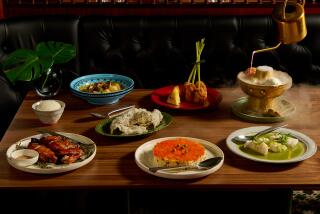Lizards, License Plates : In Asia, It’s Sure Bet a Wager Is On
- Share via
BANGKOK, Thailand — Two boys squat in the thin shade of a utility pole on a scorching Bangkok sidewalk, peering at the license plates on an oncoming car. The last number is odd, a five. To the yelp of victory, money changes hands.
In a nearby cafe, three men sit silently over a round of sweating beers and Mekhong whiskey. They watch the gecko lizards gripping the walls and ceiling, waiting for one to begin its staccato chatter. The bets are down: four chirps, six or seven.
Anything that moves, fights or bears numbers will draw a wager in Southeast Asia. Gambling is pandemic.
It’s even odds that someone in the house is playing the lottery, legal or illegal, and only a slightly longer bet that your neighbor is looking for action in mahjongg, cards or coin flipping.
Everybody’s in Game
Police gambling squads say the biggest players are the overseas Chinese, at least in the level of stakes. But nearly everybody’s in the game, from the Filipino fighting cock enthusiast to the Thais who plunge on fighting fish.
There’s a science to it, of course, but luck and superstition play as big a role. Take the lottery. While Americans bet with head and heart on the Super Bowl, Asians concentrate on finding that mystical lottery number.
“Have you ever noticed Singapore drivers craning their necks as they approach an overturned auto in a road wreck?” asked Teo Hong Guan, superintendent for specialized crimes at the city-state’s Central Intelligence Division. “They’re looking at the plates. That number is very propitious.”
In Thailand a few years back, an up-country village woman was said to have laid a stone egg. Long lines formed at the door to her hut. According to reports at the time, the visitors paid their respects to the lady with the magical powers and then asked bluntly: “What’s the (lottery) number?”
Races in Malaysia
The ponies are equally irresistible. Picture this scene on the outskirts of the Malaysian capital of Kuala Lumpur. It’s a late spring day and the lightning of a tropical storm crackles overhead. Voices rise. Three minutes to post time, fourth race.
Ten thousand pairs of eyes stare at the changing odds on the tote board. “I rather fancy No. 6,” confides Eric Wong, a legal clerk taking the afternoon off from work to “take a flutter” at the Selangor Betting Center. Wong slips five bills to a runner, who dodges across a floor covered with beer cans, chicken bones and shredded tickets to get the bet down.
They’re off! Wong fidgets, looks up and joins a chorus of shouts, drowning out the thunder, as the horses hit the home stretch. Ten thousand faces are fixed on the finish line. It’s No. 6, by a nose.
Off-Track Betting
In Kuala Lumpur, 200 monitors flash the opening odds for the fifth race. At Ipoh, a Malaysian city several hundred miles to the north, No. 6 is led to the winner’s circle. In Singapore and the Malaysian resort of Penang, thousands of gamblers, like Wong in Kuala Lumpur, crack their programs for another round of televised, off-track betting sponsored by the Malayan Racing Assn. It’s the next best thing to being there on the four-city thoroughbred circuit.
Many Asians prefer betting on the blood sports. In the Philippines, one of President Corazon Aquino’s brothers raises prize-fighting cocks. And in the poorest barrio, old men walk along the roadsides stroking the neck feathers of their long-legged champions. Cockpits, the cup-shaped arenas, dot the countryside.
In the former British territories, Singapore and Malaysia, blood sports are outlawed, but you can lay a few illegal bucks on bowling or any other athletic contest.
‘Noise Alone a Thrill’
The fast action favored by the ethnic Chinese comes in games where the bettor is a participant. In mahjongg, for instance, a domino-like game in which tiles are constantly stacked and shuffled by the players. “The noise alone will give you a thrill,” said Law Ah Kaw, head of the Singapore police gambling suppression branch.
Well-heeled gamblers will frequent the legal casinos in Malaysia, Macao and the Philippines, which feature roulette and other Las Vegas-style games. In Bangkok, the high rollers favor baccarat, played in illegal gambling dens. “Millions of baht are wagered in one of these baccarat games,” noted Police Inspector Vichai Charoenpong. One million baht is the equivalent of about $40,000.
The average gambling addict, playing for modest stakes, often sticks to card games like blackjack--usually with Western cards--such as the Thai pock deng , or to high-low dice games. “But it can be as simple as picking up a handful of toothpicks at a restaurant. Odd or even,” the inspector said.
Police Control
Police attention is centered on the illegal dens and bookmakers. The idea is to control the problem, for the authorities admit that there is no hope of eliminating it.
“There have been cases where dens started operations just two hours after a police raid,” said Law of the Singapore suppression branch. “Gamblers are incorrigible.”
In 1986, the Singaporean government gave police a boost by sharply increasing the fine for gambling den operators and increasing the maximum jail sentence from two years to five. The dens and bookmakers have increased their security as the police powers have mounted.
“Some of these chaps have walkie-talkies,” explained Supt. Teo. All the dens have lookouts--kiddingly called “red guards”--and heavily bolted doors. Still, Teo claimed, police raids have sharply reduced the number of what his men call “mini-turf clubs.”
‘Guns Come Out’
Vichai, the Bangkok police inspector, said the major problem is the gambler who loses money, borrows and then can’t make good on the debt. “Then it can get rough,” he said. “Then the guns come out.”
In the dens of Singapore and Bangkok, games are attended by a man called a ma tau, or horse’s head, in a southern Chinese dialect. He’s half pawnbroker-half loan shark. “He stands behind the players, his pockets stuffed with money,” Vichai said. When a player goes broke or needs money to stay in a hand, the ma tau will exchange, at a brutal discount, cash for valuables--a watch, a ring, anything the player has on him.
“Even these,” exclaimed one of Vichai’s men, pulling from inside his shirt the chain of Buddhist amulets that Thais wear for luck.
In Bangkok, Manila, Singapore and almost every other Southeast Asian city, gambling is run by overseas Chinese, immigrants from southern China in the late 19th and early 20th Centuries. In Singapore, British colonial officers turned over the practical administration of the Chinese quarter to the various family clan chiefs. The British called them “Captain China,” and Capt. China ran life in his wards, including the gambling.
Run by Bosses
Gambling in Bangkok is run by Thai-Chinese, with a boss for each district. “Usually he owns all the property around his den,” which is often in a slum area, Vichai said. “Shop owners, vendors, kids--they all live on his rental land, and they’re loyal. It’s almost impossible for a raiding team to approach a den without the boss being tipped off.”
The bosses are treated with great respect by the locals and addressed with the Chinese honorific sye, meaning prosperous young man.
At his office near Bangkok’s Chinatown, Vichai produced Kaew Parnsarn, a 34-year-old woman doing 15 days in the lockup for dealing blackjack. Describing her life at the tables, she explained that luck becomes a factor even before the player sits down. “Many gamblers go to the fortune tellers to choose the right day to play,” Kaew said. “Some pray at the shrine to Brahma (a Hindu deity) for luck at the game.”
And the gamblers of Southeast Asia are not without a certain measure of honor. An American described his first visit to a Philippine cockpit. “I didn’t understand the gambling aspect, all these guys flashing the odds with finger signals,” he said. “The man who escorted me explained it.
Three-to-One Odds
“ ‘See that man there across the pit. He’s offering 3 to 1 on the black cock against the brown one.’
“Well, why not, I figured, and we signaled back that I’d take the brown one for 20 pesos. Mine won, I was excited, but I sure as hell never expected to see my 60 pesos.
“We watched a couple of more fights, and then the guy on my right tapped me on the shoulder and handed me 60 pesos. It must have gone through a hundred pairs of hands to get around the pit. I was astounded.”
Told the story, an Asian policeman replied: “Let me tell you, if that man tried to leave the cockpit without paying he’d have been torn limb from limb. And if he lived, his name would have been ruined.”
More to Read
Sign up for Essential California
The most important California stories and recommendations in your inbox every morning.
You may occasionally receive promotional content from the Los Angeles Times.












